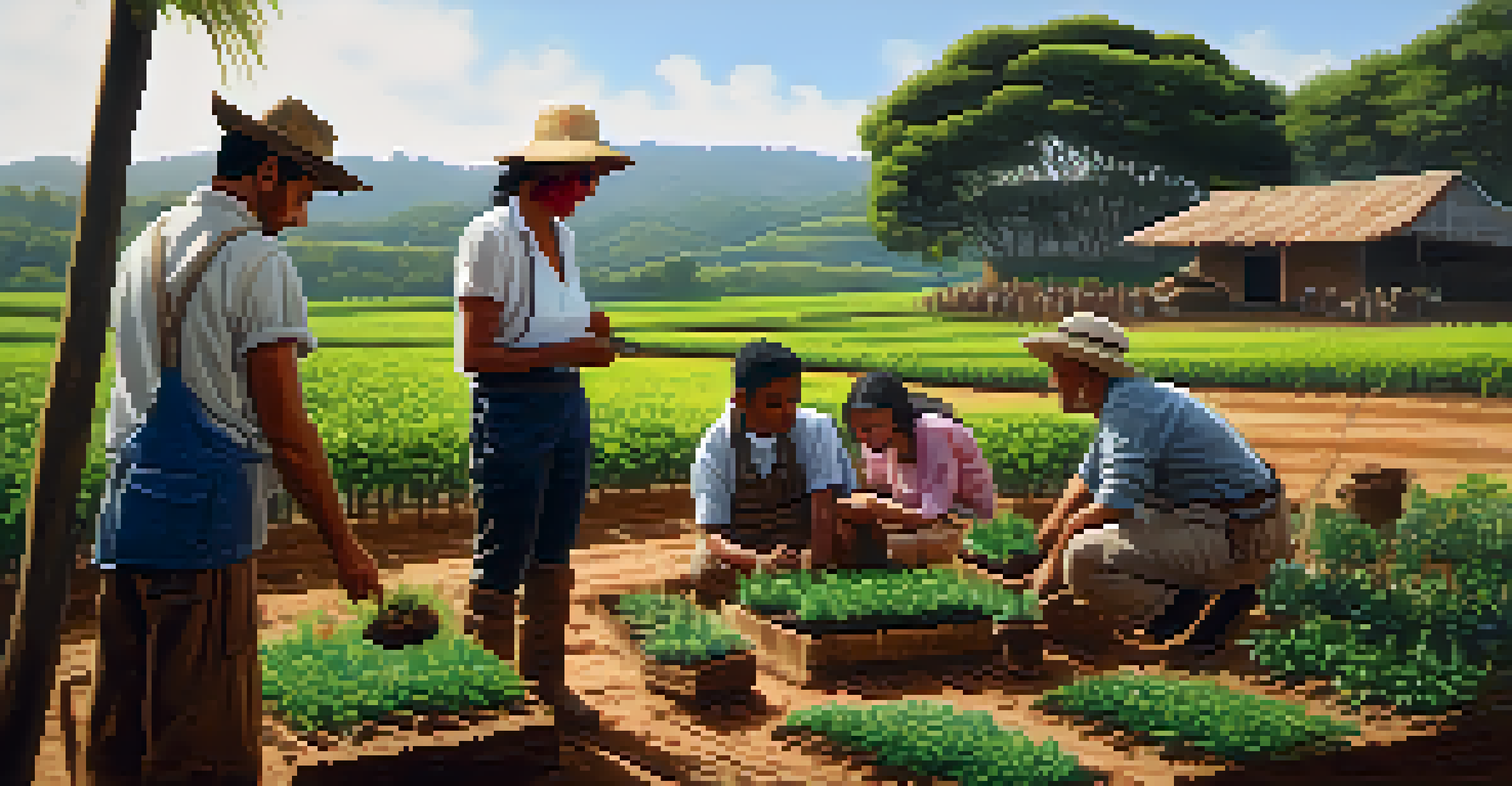Cultural Significance of Agricultural Tourism in Brazil

Understanding Agricultural Tourism and Its Roots in Brazil
Agricultural tourism, or 'agritourism,' combines farming with travel, allowing visitors to experience rural life firsthand. In Brazil, this concept is deeply rooted in the country’s diverse agricultural practices and rich cultural heritage. From coffee plantations in Minas Gerais to sugarcane fields in São Paulo, each region offers unique experiences that showcase local customs and traditions.
Agritourism is not just about visiting a farm; it's about experiencing the heart of a community.
This form of tourism not only promotes local economies but also fosters connections between urban tourists and rural communities. By engaging in activities like fruit picking, farm stays, or traditional cooking classes, visitors gain a deeper appreciation for the challenges and joys of agricultural life. It’s a tangible way for people to reconnect with their food sources and understand the importance of sustainable practices.
Moreover, agricultural tourism serves as a bridge between generations, allowing older farmers to pass down their knowledge while inspiring younger visitors. This cultural exchange enriches both the tourists and the locals, creating lasting memories and fostering a sense of community.
The Impact of Agritourism on Local Economies
Agricultural tourism significantly boosts local economies by providing additional income for farmers and rural communities. As tourists flock to experience farm life, they contribute directly to the livelihoods of those who host them. This financial influx can help sustain traditional farming practices that might otherwise decline due to urbanization and industrialization.

In addition to direct revenue from tours and activities, agritourism often leads to increased sales of local products, such as artisanal cheeses, organic fruits, and handcrafted goods. Farmers can diversify their income streams by selling these products directly to visitors, enhancing their economic stability. This not only benefits individual families but also promotes local artisans and food producers.
Agritourism Boosts Local Economies
Agricultural tourism provides significant financial support to farmers and rural communities, enhancing their economic stability.
Furthermore, the growth of agritourism can stimulate infrastructure improvements in rural areas, such as better roads, accommodations, and services. These developments make regions more accessible to tourists, encouraging even more visitors to explore Brazil’s agricultural heartlands.
Cultural Exchange: Bridging Urban and Rural Communities
One of the most beautiful aspects of agricultural tourism is the cultural exchange it fosters. Visitors from cities often arrive with preconceived notions about rural life, and their experiences on farms can challenge and enrich these views. They learn about local traditions, agricultural techniques, and the daily realities of farm life, gaining insights that textbooks can't provide.
Travel is about the connections we make, whether with people or the land; agritourism gives us both.
For rural communities, hosting tourists can be a chance to share their stories and heritage. Many farmers take pride in showcasing their unique practices, whether it’s a particular method of cultivation or a traditional recipe handed down through generations. This sharing of culture not only educates tourists but also instills pride within the local community.
Additionally, these interactions can lead to long-lasting friendships and connections that transcend geographic boundaries. Tourists often leave with more than just souvenirs; they carry stories and experiences that enrich their understanding of Brazil's diverse culture.
Promoting Sustainable Practices Through Agritourism
Sustainability is at the heart of many agritourism initiatives in Brazil. As visitors engage with local farms, they often learn about sustainable farming practices that respect the environment and promote biodiversity. This educational aspect can inspire tourists to adopt similar practices in their own lives, creating a ripple effect that extends far beyond their visit.
Farmers can showcase methods such as organic farming, permaculture, and agroforestry, highlighting the importance of caring for the land. By demonstrating that profitability can coexist with sustainability, agritourism encourages a new generation of farmers to innovate while preserving their natural resources.
Cultural Exchange Enriches Lives
Agritourism fosters valuable cultural exchanges between urban tourists and rural hosts, deepening understanding and appreciation of local traditions.
Moreover, as awareness of climate change grows, agritourism can play a crucial role in promoting environmental stewardship. Visitors leave with a better understanding of how their choices impact the planet, making them more conscious consumers in the future.
The Role of Festivals and Events in Agritourism
Festivals and events centered around agricultural themes are vital to Brazil’s agritourism scene. These celebrations not only attract tourists but also serve as a platform to showcase local culture, food, and traditions. Events like the Coffee Festival in Minas Gerais or the Banana Festival in São Paulo bring communities together, fostering pride in their agricultural products.
During these festivals, visitors can participate in workshops, tastings, and cultural performances, creating a festive atmosphere that celebrates the richness of rural life. Such experiences deepen tourists’ understanding and appreciation of agricultural practices while providing farmers a chance to connect with a wider audience.
Moreover, these events often become annual traditions, drawing repeat visitors who come back to relive the experience and explore new offerings. They help build a sense of loyalty and foster community spirit, as locals and tourists alike come together to celebrate the harvest and agricultural prowess.
Challenges Facing Agricultural Tourism in Brazil
Despite its benefits, agricultural tourism in Brazil faces several challenges that can hinder its growth. One significant issue is the lack of infrastructure in many rural areas, which can make it difficult for tourists to access farms and participate in activities. Improving roads, accommodations, and services is vital for attracting more visitors and enhancing their overall experience.
Additionally, there can be a disconnect between urban visitors and rural hosts, with differing expectations and communication barriers. It's essential for both parties to understand each other's perspectives to create positive interactions that benefit both sides. Training programs for farmers on hospitality and communication could help bridge this gap.
Sustainability Drives Agritourism
Many agritourism initiatives in Brazil prioritize sustainable practices, educating visitors and promoting environmental stewardship.
Lastly, the impact of climate change poses a threat to agricultural practices and, consequently, agritourism. Farmers need to adapt and innovate continuously to sustain their livelihoods, making it crucial for the agritourism sector to support and promote resilient practices.
Future Trends in Brazil’s Agricultural Tourism Landscape
Looking ahead, Brazil’s agricultural tourism sector is poised for growth, driven by increasing global interest in sustainable travel and authentic experiences. As more travelers seek to connect with nature and local cultures, agritourism provides a perfect avenue for exploration and learning. This trend aligns with a broader shift toward responsible tourism, where visitors are more mindful of their impact on local communities.
Emerging technologies, such as virtual reality and online booking platforms, are also set to transform the agritourism experience. Farmers can showcase their offerings through engaging digital content, making it easier for tourists to discover and book their experiences. This innovation can attract a wider audience and enhance the visibility of lesser-known destinations.

Furthermore, partnerships between farmers, local governments, and tourism organizations will be crucial in promoting Brazil as a prime agritourism destination. By working together, these stakeholders can develop marketing strategies that highlight the country’s unique agricultural practices and cultural richness, ensuring a bright future for agritourism in Brazil.